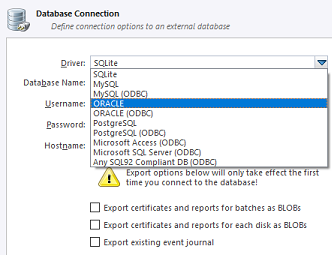Journal Export
KillDisk's Export feature allows to send out all the current logs, certificates and reports from locally stored database over the network to the external SQL database. Both local Event Journal and all future transactions can be exported after connection to database is established.
Supported connections to different SQL databases:
- Any SQL92 Compliant Database (via ODBC)
- Microsoft Access
- Microsoft SQL Server
- PostgreSQL
- ORACLE
- MySQL
- SQLite
To connect to the external SQL database do one of the following:
- Navigate to or press F10. Then click Database Connection tab on the left.
- Alternatively on the file menu bar navigate to or press CTRL + L. Then click Connect toolbar button.
- Database Connection dialog appears:

- Select a Driver for the particular database you want to connect to from the list of databases.
- Type in the database Name on the remote end.
- Type in the database Username for the connection.
- Type in the database Password for the selected user.
- Type in the Hostname (which can be IP address or local Network Server Name).
- Select a TCP/IP Port to use if it is different from the default value.
- Verify settings for the additional export options:
- Export certificates and reports for batches
- Export certificates and reports for particular disks
- Export existing event journal (can be done only once per a new connection)
- Click OK to test connection and store connection parameters in settings for future use.
Once a connection to the external SQL database is established KillDisk starts exporting all information related to all current operations automatically.
Note:
For the database export to be successful you need to provide a database user with privileges enough for creation two tables (DISKS and BATCHES) and populating these tables.